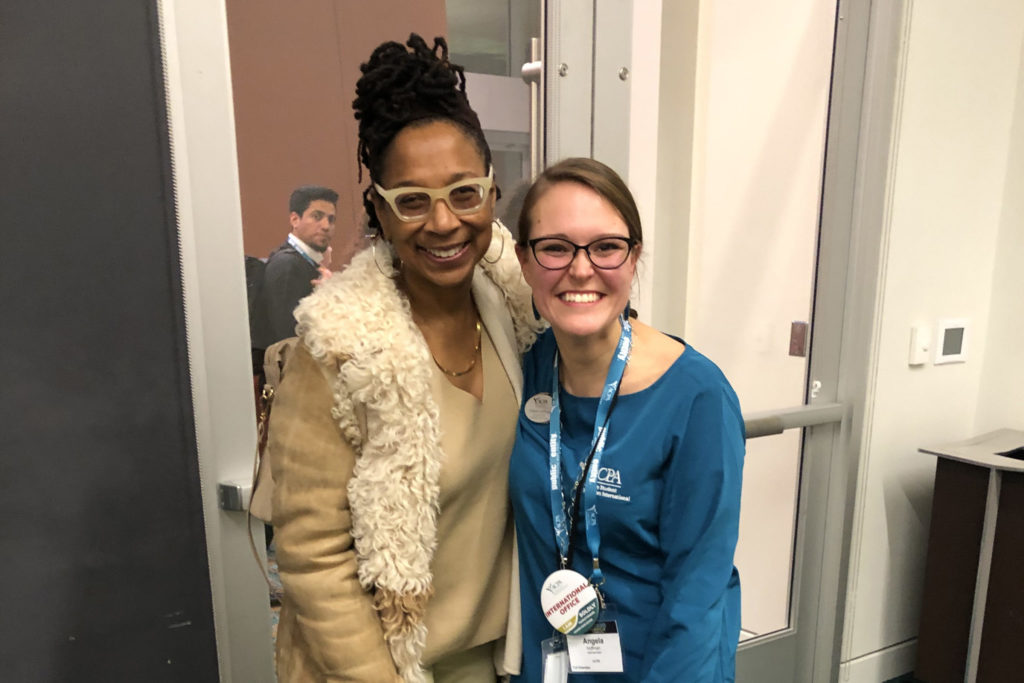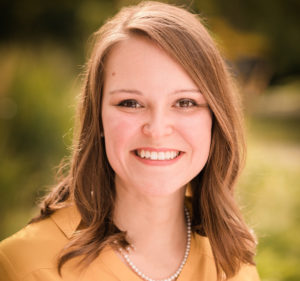By student writer Samantha Ye

It’s not often you get to meet a theory-revolutionizing expert related to your work. But as School of Education student Angela Hoffman-Cooper begins her dissertation on supporting students with experience in foster care, she can say she met Kimberlé Crenshaw, a leading scholar of critical race theory who coined the critical concept of intersectionality – a concept that factors heavily in Hoffman-Cooper’s research.
Hoffman-Cooper is a doctoral candidate in CSU’s Higher Education Leadership program and a staff member at ACPA —College Student Educators International.
Learning directly from the source
While planning the 2020 ACPA convention, Hoffman-Cooper was instrumental in bringing Crenshaw in as the opening keynote speaker.
“The planning team for this annual convention and I were aware that intersectionality is a term that is used commonly now in higher education,” said Hoffman-Cooper. “But we understand that we don’t always have the same shared definition of what intersectionality is when we’re talking about it.”
The team’s discussions led to an invitation to Crenshaw to speak about intersectionality and her intentions behind the term.
Crenshaw’s ACPA speech to roughly 2,000 attendees focused on “defining intersectionality as a prism for understanding, to shine light on the dynamics of the intersections of identity and the intersections of systems of oppression,” Hoffman-Cooper said.
The concept of intersectionality says structural oppression impacts people in different ways depending on multiple, overlapping aspects of their perceived identity. During her keynote, Crenshaw talked about intersectional policy failures, including the court case that led her to conceptualize the term in the first place.
A district judge in the 1976 DeGraffenreid v. General Motors case discounted the possibility of General Motors discriminating against Black women based on their gender or race when it was shown that the company was hiring Black men and white women, thus revealing a breakdown in systemic policy.
Crenshaw’s keynote further focused on how intersectionality is used in analysis for intervention to actually do something for those disproportionately impacted and marginalized by systems of oppression.
“It was definitely a celebratory moment for our team to have her there and to see the overwhelming response from conference attendees, who were so excited that we were addressing these topics and ready to engage,” said Hoffman-Cooper.
Applying an intersectional lens to research

Having had the opportunity to experience Crenshaw’s work, Hoffman-Cooper said she can better think through how to incorporate an intersectional lens in her research on supporting students with experience in foster care and higher education.
“Youth with experience in foster care are more likely to have a disability, more likely to be a person of color, more likely to be LGBTQ, and more likely to experience homelessness,” said Hoffman-Cooper. “So there are all these outcomes that then become sort of coupled and layered on top of each other that disproportionately impact that student population, so there need to be policies that address those situations.”
Hoffman-Cooper is particularly interested in identity development in students with experience in foster care. Intersectionality comes into play when making sure these students are represented in their full robust and dynamic lives – because that is their reality.
Having experienced foster care as a youth and aged out at college, Hoffman-Cooper is committed to supporting other youth and students with lived experience. She has since had opportunities to work with that diverse population, while considering her own white privilege in the ways our institutions are structured.
In 2018, she helped build the Foster Scholars, a virtual community of other practitioners, educators and faculty with lived experience in foster care.
“It has been really affirming,” Hoffman-Cooper said of the community. “We hold a variety of identities, and it’s been great to really reflect on our experiences and the similarities and differences in that space as well.”
Foster Scholars recently hosted events on supporting Black foster youth and the unique perspectives foster scholars bring to their research.
Intersectionality in higher education
Intersectionality is becoming a more widespread topic in equity discussions at higher education.
“I think that, in a lot of ways, how higher education views certain student populations is very monolithic and doesn’t attend to those intersections in our policies or in practices,” said Hoffman-Cooper. “There may be policies and practices that protect some marginalized students, but not students that are marginalized at the intersection of these multiple identities.”
For those looking to use the framework of intersectionality, Hoffman-Cooper recommends they acknowledge the critical work of Crenshaw and other Black women in the field.
“I would encourage folks who are interested in learning more about intersectionality or using it in their work to really return to some of the original works and the original scholars and scholars of color, who’ve engaged in the work and done the labor,” said Hoffman-Cooper.
For Hoffman-Cooper, higher education administration – especially relating to student affairs – remains a space where she can help transform the narrative for and with students with experience in foster care.
“Angela is a leader with compassion and an emerging scholar-leader in higher education, who is advancing research and equity in higher education,” said OiYan Poon, Hoffman-Cooper’s adviser in the Higher Education Leadership program. “She is just one example of many students who exemplify the values of the HEL program.”
Higher Education Leadership is a doctoral specialization offered by the School of Education, part of CSU’s College of Health and Human Sciences.